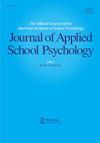Psychoeducational Assessment of Transgender and Gender Nonconforming (TGNC) Individuals: Recommendations for Best Practices
IF 1.5
Q4 PSYCHOLOGY, EDUCATIONAL
引用次数: 1
Abstract
Abstract This article addresses the need to support and advocate for students identifying as transgender/gender nonconforming (TGNC). As school psychologists, the standards and practices as outlined by the National Association of School Psychologists and the American Psychological Association emphasize the respect and protection of people of all ethnicities, cultural background, creeds, gender identity and how they identify themselves as people. School psychologists work to engage and advocate ranging from an individual student to helping evaluate and transform delivery of services, including assessment, systemically, such as schools and training programs. The authors have reviewed literature and advocacy resources in identifying the roles of school psychologists in this role of advocacy. The authors describe the intersection of person, all the confluences of what becomes that person, and society. The referral for assessment and the assessment, itself, is often the start of the school psychologist’s interactions with the students with whom they engage and support in the school setting. The intention of this article is to convey resources, provide professional context, and start a list of resources to support, at times evaluate needs, and to advocate for their needs. The issue, as stated, is not having TGNC individuals educate the professionals on who they are but for the school psychologists to develop an understanding of this aspect of the human experience as children, neighbors, partners, and a continuum of humanity.跨性别和性别不合规(TGNC)个体的心理教育评估:最佳实践建议
摘要本文论述了支持和倡导被认定为跨性别/性别不合规(TGNC)的学生的必要性。作为学校心理学家,全国学校心理学家协会和美国心理协会制定的标准和做法强调尊重和保护所有种族、文化背景、信仰、性别认同以及他们如何认同自己。学校心理学家致力于吸引和倡导从单个学生到帮助评估和转变服务提供,包括评估,系统地,如学校和培训项目。作者回顾了文献和宣传资源,以确定学校心理学家在宣传中的作用。作者描述了人与社会的交集,以及人与社会之间的所有交集。转介评估和评估本身通常是学校心理学家与他们在学校环境中参与和支持的学生互动的开始。这篇文章的目的是传达资源,提供专业背景,并启动一个资源列表来支持,有时评估需求,并倡导他们的需求。如前所述,问题不是让TGNC个人教育专业人士他们是谁,而是让学校心理学家了解作为儿童、邻居、伴侣和人类连续体的人类体验的这一方面。
本文章由计算机程序翻译,如有差异,请以英文原文为准。
求助全文
约1分钟内获得全文
求助全文
来源期刊

Journal of Applied School Psychology
PSYCHOLOGY, EDUCATIONAL-
CiteScore
2.40
自引率
10.00%
发文量
7
期刊介绍:
With a new publisher (Taylor & Francis) and a new editor (David L. Wodrich), the Journal of Applied School Psychology will continue to publish articles and periodic thematic issues in 2009. Each submission should rest on either solid theoretical or empirical support and provide information that can be used in applied school settings, related educational systems, or community locations in which practitioners work. Manuscripts appropriate for publication in the journal will reflect psychological applications that pertain to individual students, groups of students, teachers, parents, and administrators. The journal also seeks, over time, novel and creative ways in which to disseminate information about practically sound and empirically supported school psychology practice.
 求助内容:
求助内容: 应助结果提醒方式:
应助结果提醒方式:


